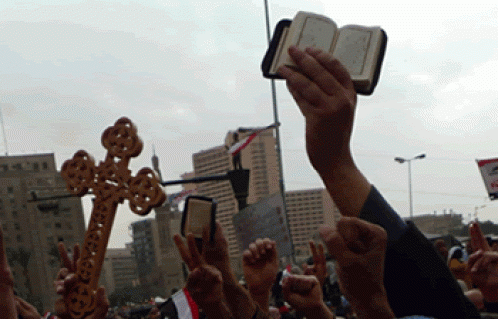Forces of Unity to Sweep Aside Egypt’s Agents of Division
 The recent burning of two churches in Cairo’s Imbaba district reminded me of New Year’s Eve this year, when I was in Cairo. At the time, I heard about the bombing of the church in Alexandria, and I saw the outrage that took place on the streets of Cairo – and the solidarity it resulted in, with Muslim men and women standing guard outside of churches on 7 January, when Copts celebrated Christmas.
The recent burning of two churches in Cairo’s Imbaba district reminded me of New Year’s Eve this year, when I was in Cairo. At the time, I heard about the bombing of the church in Alexandria, and I saw the outrage that took place on the streets of Cairo – and the solidarity it resulted in, with Muslim men and women standing guard outside of churches on 7 January, when Copts celebrated Christmas.
That solidarity between Muslims and Christians in Egypt was not short-lived, but a deeply felt, rooted expression. Anyone who had been in Tahrir Square during the uprising knows that – and anyone who had been outside the attacked churches during the uprising knows that too.
No one was outside attacked churches during the uprising – because no churches were attacked. At a time when there was complete lawlessness on the streets, as the regime pulled off the police forces, churches were safe. Had there been such a violent sentiment against Christians in Egypt, that would have been the time to pounce.
In the weeks after the uprising, the former interior minister was officially the subject of an investigation into that New Year’s Eve bombing. The accusation prompting the inquiry was that his ministry was responsible for the bombing in order to shore up support the regime. The investigation continues, although in the court of public opinion (if not in the judiciary system), the verdict was fairly clear. There’s a positive aspect to that – the anti-sectarian mood was clearly what Egyptians were feeling.
I sincerely hoped that would be the way things would continue indefinitely. In recent days, however, it’s been clear that will not be Egypt’s future – at least not for the short or medium term. The two churches burned in Imbaba have raised the spectre of continued religiously based sectarian violence.
When it comes to religion and the public sphere, the Muslim Brotherhood is probably the most influential group in Egypt in terms of bringing religion into it for political ends. Egyptians know that the Muslim Brotherhood sincerely and publically denounced the bombing in Imbaba. Yet, Egyptians also know that the Muslim Brotherhood did not descend on Imbaba to work directly on calming sectarian tensions. Perhaps in the future, it might intervene more through the masses it can bring out. It certainly would build trust in wider society for the movement. It’s never had to play this kind of bridge-builder role before – but Egypt now requires that it do so.
Indeed, Egypt requires all Egyptians do so. While the Muslim community needs to take a hard look at what it may or may not do in order to build trust, the Christian community would probably benefit from reconsidering some of the stances that a minority within it has taken, particularly vis-à-vis the indigenous nature of the Muslim community as well as American intervention to solve the sectarian issue. There have been inflammatory statements and acts of violence emanating from both Muslims and Christians, which will also need to be discussed in safe environments in the future – not for the purpose of playing the ”blame game”, but to establish the facts against a backdrop in which an overwhelming majority of Egyptians oppose sectarianism and want a future where all citizens can feel they are of Egypt, and not some sort of foreign or alien element.
At the moment, there are many in Egypt suspecting that this is not the case for some Muslims and some Christians – and that suspicion has to be put to rest, for once and for all. A new Egypt deserves, requires and demands no less.
The unity of Egyptians is far stronger than the forces of division – and the sense of Egyptian patriotism is more mainstream than the sense of Egyptian sectarianism.
Egyptians can drain the swamp – and they can remove the fuel for divisive forces to use. Tahrir Square, Egyptians were reminded time and time again, brought out the best of what it meant to be an Egyptian. Now all Egyptians must find the best within themselves, and together they must confront the worst – and defeat it.
Dr H.A. Hellyer (www.hahellyer.com), a Fellow of the University of Warwick, and of the Institute for Social Policy and Understanding, contributed this piece from Cairo, where he is currently writing a book on the Arab uprisings



One Response to Forces of Unity to Sweep Aside Egypt’s Agents of Division
You must be logged in to post a comment Login